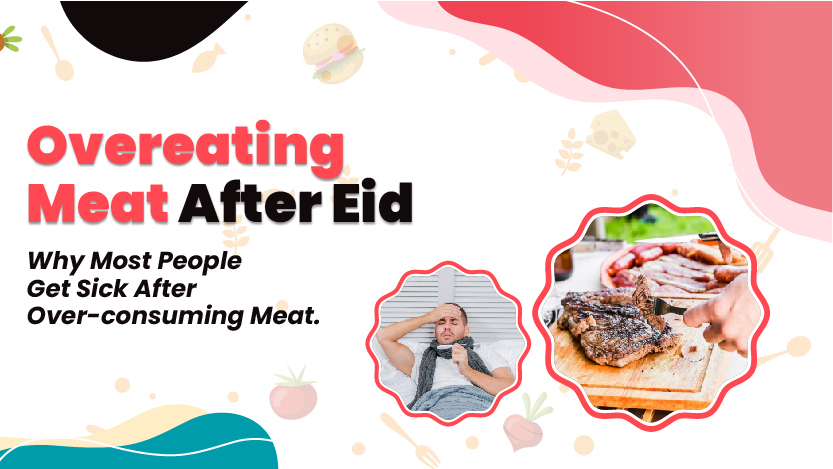Is it even Eid if you don’t overeat? The two Eids, Eid ul-Fitr and Eid ul-Adha, are festivals celebrated by the Muslim community worldwide. Eid Ul Adha begins with the Eid prayer in the community Mosque, followed by the slaughtering of the animal in the name of Allah. Then begins the endless eating festivities. Different festive, scrumptious dishes are cooked, and the family gathers to eat them together. This continues for a good three days in our Pakistani community.
The auspicious occasion of Eid means a feast where the entire family hangs out together, but it also leads to an uncomfortable aftermath, which is overeating. And just not plain overeating but overconsumption of meat in the body, which leads to health issues,
Let us understand what overeating does to our bodies so that we are mindful of our choices at family gatherings.
1. The Festive Feasting Tradition
Eid brings to mind elaborate meal tables with a rich and traditional variety of dishes. Eid ul Adha—the meaty Eid—is meat-centric, which means an abundance of meat-based dishes, including curries, kebabs, pulao, and biryani. People enjoy barbeque as well, but barbeque in this hot weather is not a preference of many.
Let us understand Overeating:
2. Why Do People Overeat?
- Cultural and Social Pressure: In our Asian culture, we reciprocate hospitality with an abundance of food dishes that we prepare for family and friends. Our hospitality ideology is all about having more food on our tables. Hence, the guests feel obliged and embarrassed if they don’t eat. This constant insistence on eating more food often leads to overeating, as the host keeps serving big portions.
- Celebratory Atmosphere: We are strong believers in eating our tummies out during times of celebration. Eid means overindulgence for us. The special efforts made on the days of Eid tempt even people with little appetite to eat more than they normally do.
- Psychological Factors: A norm of our society is that you are on a balanced diet on the days before Eid so that you eat your heart out on the day of Eid. On this festive day, they come out of their dietary restrictions and consume more food than usual.
- Variety of Dishes: Eid means a variety of food on the table. A table spread that is not only lavish but has a dish for every age group and taste bud. In an attempt to taste each dish, people often overeat on Eid. These buffet-effect table spreads usually lead to overeating.
3. The Impact of Over-Consuming Meat
As human beings, we often enjoy indulging occasionally during unique festivals. However, on Meaty Eid, excess meat consumption leads to severe issues. Let’s discuss these issues.
- Digestive Problems: excess meat consumption can intimidate the digestive system, leading to bloating and indigestion. This all starts with a slightly uncomfortable feeling. Meat is all about protein and fat, which naturally means the body works more challenging to get them digested.
- Dehydration: Eid Ul Adha falls in summer, and these meaty dishes are high in protein, which increases the urge to hydrate to eliminate the by-products of metabolism through the kidney. If enough liquids aren’t consumed, these two factors often lead to dehydration.
- Gastrointestinal Distress: meaty dishes are prepared with rich flavor using spices and meat, particularly fatty cuts that usually slow down the digestive pathway, leading to constipation or diarrhea. However, it also causes heartburn and acid reflux.
- Increased Risk of Foodborne Illness: the hot weather and irresponsible handling of meat can lead to foodborne illnesses. The lavish gathering requires a lot of management and can be challenging for the host to keep the meat fresh and free from contaminants.
- Inflammation and Chronic Diseases: Diets high in red and processed meats have been linked to increased inflammation in the body, contributing to conditions such as heart disease, diabetes, and certain cancers.
4. Why Does Overeating Make Us Sick?
A significant psychological need to understand is how our body responds to excessive meat consumption. Let’s interpret the physiological processes involved.
- Digestive Overload: When we overeat, our stomachs have elastic tissues that stretch beyond their normal capacity. The digestive pathways are not designed to control excessive amounts of food, which leads to discomfort and slows down digestion. However, the body produces more bile to emulsify the fats, which leads to bloating and indigestion.
- Metabolic Strain: the metabolic pathways to break down fats and proteins are more complex than carbohydrates. More proteins mean a more significant workload, overwhelming the kidneys and liver. This is the primary reason people experience fatigue and dehydration during Eid.
- Nutrient Imbalance: Overeating meat disturbs the nutritional balance. As meat lacks fiber, digestion gets slower. More meat means fewer vegetables, affecting overall health.
- Hormonal Response: Hormonal responses are the hormones that regulate our appetite and disturb us when we overeat on Eid. The hormonal balance is disturbed, leading to prolonged periods of fullness and indigestion.
5. Tips to Avoid Overeating During Eid
Every Muslim must enjoy the festival of Eid, but we can celebrate it without overindulging. While it’s natural to want to enjoy festive meals, there are ways to celebrate without overindulging:
- Practice Portion Control: use smaller plates where you enjoy each meal in smaller portions and savor each bite.
- Stay Hydrated: Hydration is essential to improve digestion. It also gives a feeling of fullness, which saves you from overindulging.
- Include Vegetables and Fruits: Balance the Eid meals with plenty of vegetables, fruits, and whole grains. Add veggies to dishes like roast and grilled meats. These foods provide essential nutrients and fiber, aiding digestion and preventing overeating.
- Eat Mindfully: Listen to your body carefully. Understand how much food is required by the body. Avoid overconsumption. Pay attention to hunger and fullness cues. Eating slowly and savoring each bite can help prevent overconsumption.
Conclusion
Eid is a festival that must be enjoyed in its fullness. It brings the family together, and everyone should be a part of these celebrations. While it’s essential to celebrate together, it is also important to eat mindfully. Avoid overconsumption of meat and share portions of meat with those needy around you so that, as a nation, we can celebrate Eid. It is important to reflect on our actions on such auspicious occasions when our religion asks us to come closer.





4,034 Comments